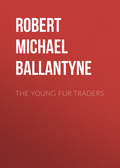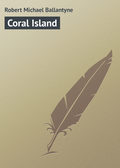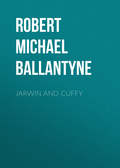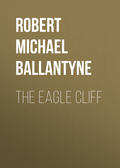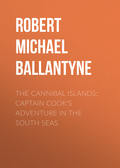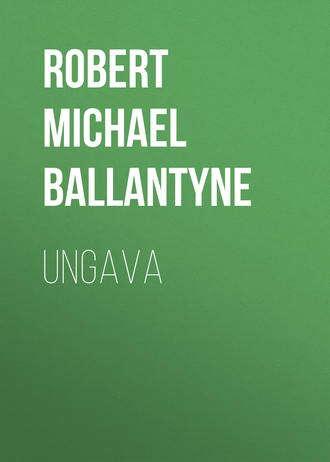
Robert Michael Ballantyne
Ungava
Chapter Twenty Six.
An excursion—Igloo building, and fishing under the ice—A snow-table and a good feast—Edith spends the night under a snow-roof for the first but not the last time
“Now then, Edith,” cried Frank, looking in at the door of the hall, “your carriage waits, and Chimo is very restive.”
“Coming, coming,” exclaimed a treble voice within; “I’m getting new lines put to my snow-shoes, and will be ready in two minutes.”
Two minutes, translated into female language, means ten, sometimes twenty. Frank knew this, and proceeded to re-adjust the sash that secured his leathern capote, as he walked towards the little sledge in front of the fort. He then tied down the ear-pieces of his fur cap more carefully, for it was very cold, though clear and sunny. The frost had set fast the lake opposite the fort, and, by thus removing the frost-cloud that overhung the open water farther out to sea, relieved the fort from the mists in which it was usually enveloped. By this time fifteen out of the “two” minutes having elapsed, he re-examined the lock of his gun, and adjusted the warm deerskin robe on Edith’s little sledge, patted Chimo on the head, looked up at the clouds, and began to whistle.
“Now, Frank, here I am,” cried Edith, running towards him with her snow-shoes in her hand, followed by her father and mother.
“Quiet, Chimo—down, sir!” said Frank, restraining the dog as it sought to bound towards its mistress. Being harnessed to the sledge, this was a very improper proceeding and was rebuked accordingly; so Chimo was fain to crouch on the snow and look back at Edith as Frank placed her in the sledge, and arranged the deerskin robes round her.
Edith wore a long fur cloak and cloth leggings. Her feet were protected from the cold by two pair of blanket socks, besides very thick moccasins of deerskin. The usual head-dress of civilised females in these regions is a round fur cap; but Edith had a peculiar affection for the Cree Indian headdress, and, upon the present occasion, wore one which was lined with fur and accommodated with ear-pieces, to defy the winter cold. The child’s general appearance was somewhat rotund. Painters would probably have said there was a little too much breadth, perhaps, in the picture. Her pointed cap, however, with the little bow of ribbon on the top, gave her a piquant air, and did away with the heavy appearance of her costume to some extent; in fact, Edith looked like a fat little witch. But if she looked fat before being wrapped up in the sledge furs, she looked infinitely fatter when thus placed, and nothing of her visible except her two twinkling eyes. So grotesque was she that the whole party burst into a loud laugh as they surveyed her. The laugh made Chimo start off at full gallop, which caused Frank to grasp the line of the sledge that trailed behind, and hurry over the snow at a most undignified pace.
“Take care of her,” cried Mr Stanley.
“Ay, ay,” shouted Frank.—“Softly, Chimo—softly, you rascal!”
In ten minutes the travellers were round the point and fairly out of sight; but the shouts of Frank, and an occasional howl from Chimo, floated back on the breeze as Stanley and his wife returned leisurely to the hall.
The road, or rather the ground, over which Frank Morton drove Edith that day was exceedingly rough and rugged—so rough that we will not try the endurance of the reader by dragging him over it. We will merely indicate its general features. First of all, they drove about three miles along the level snow at the foot of the mountains. So far the road was good; and Chimo went along merrily to the music of the little thimble-like brass bells with which his harness was garnished. Then they came to a ravine, and Edith had to get out, put on her snow-shoes, and clamber up, holding by Frank’s hand; while Chimo followed, dragging the sledge as he best could. Having gained one of the terraces, Edith slipped her feet out of the snow-shoe lines, jumped into the sledge, and was swept along to the next ravine, where she got out again, resumed her snow-shoes, and ascended as before. Thus they went up the ravines and along the terraces until the summit of the first mountain range was reached. Having rested here a few minutes, Edith once more got into the sledge, and Chimo set off. But as there was now a long piece of level ground over which for some miles they could travel in the direction of the coast, Frank took the sled-line in his hand, and held the dog at a quick walking pace. Afterwards they turned a little farther inland, and came into a more broken country, where they had sometimes to mount and sometimes to descend the hills. There were many gorges and narrow fissures in the ground here, some of which were covered over and so concealed with snow that the travellers ran some risk of falling into them. Indeed, at one place, so narrow was their escape that Chimo fell through the crust of snow, and disappeared into a fissure which descended a hundred feet sheer down; and the sledge would certainly have followed had not Frank held it back by the line; and Chimo was not hauled up again without great difficulty. After this, Frank went in front with a pole, and sounded the snow in dangerous-looking places as he went along.
Towards the afternoon they arrived at the lake where they intended to encamp, and, to their great delight, found Maximus there already. He had only arrived a few minutes before them, and was just going to commence the erection of a snow-house.
“Glad to see you, Maximus,” cried Frank, as he drove up. “How’s the old woman, eh?”
“She small better,” replied Maximus, assisting Edith to alight. “Dis goot for fish.”
Maximus was a remarkably intelligent man, and, although his residence at the fort had been of short duration as yet, he had picked up a few words of English.
“A good lake, I have no doubt,” replied Frank, looking round. “But we need not search for camping ground. There seems to be very little wood, so you may as well build our hut on the ice. We shall need all our time, as the sun has not long to run.”
The lake, on the edge of which they stood, was about a mile in circumferenee, and lay in a sort of natural basin formed by savage-looking hills, in which the ravines were little more than narrow fissures, entirely devoid of trees. Snow encompassed and buried everything, so that nothing was to be seen except, here and there, crags and cliffs of gray rock, which were too precipitous for the snow to rest on.
“Now, Eda, I will take a look among these rocks for a ptarmigan for supper; so you can amuse yourself watching Maximus build our house till I return.”
“Very well, Frank,” said Edith; “but don’t be long. Come back before dark; Chimo and I will weary for you.”
In a few minutes Frank disappeared among the rocks upon the shore; and Maximus, taking Edith by the hand, and dragging her sledge after him, led her a couple of hundred yards out on to the ice, or, more properly speaking, the hard beaten snow with which the ice was covered. Chimo had been turned loose, and, being rather tired after his journey, had coiled himself up on a mound of snow and fallen fast asleep.
“Dis place for house,” said Maximus, pausing near a smooth, level part of the lake. “You stop look to me,” he added, turning to the little girl, who gazed up in his large face with an expression half of wonder and half of fun. “When you cold, run; when you hot, sit in sled and look at me.”
In compliance with this request, Edith sat down in her sledge, and from this comfortable point of view watched the Esquimau while he built a snow-hut before her.
First of all, he drew out a long iron knife, which had been constructed specially far him by Bryan, who looked upon the giant with special favour. With the point of this he drew a circle of about seven feet in diameter; and so well accustomed was he to this operation that his circle, we believe, could not have been mended even by a pair of compasses. Two feet to one side of this circle he drew a smaller one, of about four feet in diameter. Next, he cut out of the snow a number of hard blocks, which were so tough that they could not be broken without a severe blow, but were as easily cut as you might have sliced a soft cheese with a sharp knife. These blocks he arranged round the large circle, and built them above each other, fashioning them, as he proceeded, in such a manner that they gradually rose into the form of a dome. The chinks between them he filled compactly with soft snow, and the last block, introduced into the top of the structure, was formed exactly on the principle of the key-stone of an arch. When the large dome was finished, he commenced the smaller; and in the course of two hours both the houses—or, as the Esquimaux call them, igloos—were completed.
Long before this, however, Frank had returned, from an unsuccessful hunt, to assist him; and Edith had wondered and wearied, grown cold and taken to running with Chimo, and grown warm and returned to her sledge, several times. Two holes were left in the igloos to serve as doors; and, after they were finished, the Esquimau cut a square hole in the top of each, not far from the key-stones, and above the entrances. Into these he fitted slabs of clear ice, which formed windows as beautiful and useful as if they had been made of glass. There were two doorways in the large igloo, one of which faced the doorway of the smaller. Between these he built an arched passage, so that the two were thus connected, and the small hut formed a sort of inner chamber to the larger.
“Now, dem done,” said Maximus, surveying his work with a satisfied smile.
“And very well done they are,” said Frank. “See here, Eda, our snow-fort is finished. The big one is to be the grand hall and banqueting-room, and yonder little hut is your private boudoir.”
“Mine!” exclaimed Edith, running away from Chimo, with whom she had been playing, and approaching the new houses that had been so speedily put up. “Oh, how nice! what fun! only think!—a snow bedroom! But won’t it be cold, Frank? And is the bed to be of snow too?”
The black moustache of the giant curled with a smile at the energy with which this was said.
“We will make the bedsteads of snow, Eda,” replied Frank, “but I think we shall manage to find blankets of a warmer material.—Now, Maximus, get the things put inside, and the lamp lighted, for we’re all tired and very hungry.”
The lamp to which Frank referred was one which Maximus had brought, along with a few other articles, from the Esquimau camp. It was made of soft stone, somewhat in the form of a half moon, about eight inches long and three broad, and hollowed out in the inside. Esquimaux burn seal-fat in it, and in winter have no other means of warming their houses or cooking their food. But for both purposes it is quite sufficient. The heat created by these lamps, combined with the natural warmth of the inhabitants, is frequently so great in the igloos of the Esquimaux that they are fain to throw off a great portion of their upper garments, and sit in a state of partial nudity; yet the snow-walls do not melt, owing to the counteracting influence of the intense cold without.
Maximus had brought some seal-fat, or blubber, along with him. A portion of this he now put into the lamp, and, placing the latter on a snow-shelf prepared expressly for it, he set it on fire. The flame, although not very steady, was bright enough to illuminate the large igloo, and to throw a strong gleam into the smaller one. Over this lamp Frank placed a small tin kettle, filled with snow, which was speedily converted into water; and while this was being boiled, he assisted Edith in spreading out the bedding. As we have already said, the floor of this snow-house was of the same material as the walls. But one-half of it was raised about a foot above the other half, according to Esquimau rules of architecture. This elevated half was intended for the bed, which consisted of a large deer-skin robe, spread entirely over it, with the soft hair upwards. Another large robe was placed above this for a blanket, and a smaller one either for a pillow or an additional covering if required; but both of these were tossed down in a heap at the present time, to form a luxuriant seat for Frank and Edith. As their legs hung over the edge of the elevated couch, they were thus seated, as it were, on an ottoman. A mat of interlaced willows covered the floor, and on this sat Maximus, towering in his hairy garments like a huge bear, while his black shadow was cast on the pure white wall behind him. In the midst stood a small table, extemporised by Frank out of a block of snow, and covered with the ample skirt of his leathern topcoat, which the increasing temperature of the air inside the igloo rendered too warm.
Beside Edith, on the most comfortable portion of the ottoman, sat Chimo, with an air of majestic solemnity, looking, as privileged dogs always do look under like circumstances, as if the chief seat belonged to him as a matter not of favour but of right. On the table was spread a solid lump of excellent pemmican—excellent, because made by the fair hands of Mrs Stanley. It stood vis-à-vis to a tin plate whereon lay three large steaming cuts of boiled fresh salmon—fresh, because, although caught some months before, it had been frozen solid ever since. There was a large tin kettle of hot tea in the centre of the board—if under the circumstances we may use the term—and three tin cups out of which to drink it; besides a plate containing broken pieces of ship-biscuit and a small quantity of sugar wrapped up in a morsel of paper. Also a little salt in a tin box.
All these things, and tempting delicacies, had up till now been contained within the compass of a small, compact, insignificant-looking parcel, which during the journey had occupied a retiring position in the hinder part of Edith’s sledge—so true is it that the really great and the useful court concealment until duty calls them forth and reveals their worth and their importance to an admiring world. The admiring world on the present occasion, however, consisted only of Frank, Edith, Maximus, and Chimo; unless, indeed, we may include the moon, who at that moment poured her bright beams through the ice-window of the hut and flooded the centre of the snow-table with light.
“Aren’t we snug, Eda?” cried Frank, as he filled her tin with tea. “What a charming house! and so cheap, too! There’s sugar beside you. Take care you don’t use salt by mistake.—Maximus, hold out your pannikin. That’s the true beverage to warm your heart, if you take it hot enough.”
“Tankee, sur,” said the giant, extending his cup with one hand, while with the other he forced into his capacious mouth as much pemmican as it could hold.
“Frank,” said Edith, “we must build an igloo at the fort when we return.”
“So we will, now that I know how to do it. Hand me the salt, please, and poke Chimo’s nose away from the salmon. Yes, and we’ll invite papa and mamma to come and take supper at our house.—Maximus, is this the exact way your friends build their winter houses?”
“Yis, sur,” answered the Esquimau, looking up from the cut of salmon which he lifted with his fingers in preference to a fork or knife. “Dey always buil’ um so. But not dis t’ing,” he added, touching the snow-table.
“No, I suppose not,” said Frank. “I flatter myself that that is a recent improvement.”
“We do great many igloo sometime,” continued Maximus, “vid two, t’ree, four—plenty pass’ges goin’ into von a-doder.”
“What does he mean by that?” inquired Edith, laughing.
“I suppose he means that they connect a number of their igloos together by means of passages.—And do they keep them as clean and snug as this, Maximus?”
The Esquimau replied by a loud chuckle, and a full display of his magnificent teeth, which Frank understood to signify a decided negative.
When supper was ended Chimo was permitted to devour the scraps, while Frank assisted Edith to arrange her little dormitory. It was much the same in its arrangements as the larger apartment, and was really as comfortable and warm as one could desire. Returning to the large apartment, Frank spread out the couch on which he and Maximus were to repose; and then, sitting down beside the stone lamp, he drew forth his Bible, as was his wont, and began to read.
Soon after lying down Edith heard the deep voices of her companions engaged in earnest conversation; but these sounds gradually died away, and she fell asleep, to dream of her berry-ravine at Fort Chimo. As the night wore on, the deep breathing of the men told that they, too, had sought and found repose. The lamp burned slowly down and went out, and, when the moon threw her parting rays over the scene, there was nothing to tell of the presence of human beings in that cold, wild spot, save two little white mounds on the frozen lake below.
Chapter Twenty Seven.
Frank Morton gets into difficulties
Chimo’s loud bark and the angry snarl of a large wolf, as it darted away to seek the shelter of the kills, were the sounds that awoke our travellers in the grey dawn of the following morning.
Frank started up, seized his gun, and darted through the doorway of the igloo; in doing which he dashed the door of snow to atoms. He had only the satisfaction, however, of seeing the wolf’s tail flourish in the air, as the animal bounded over a snow-drift and disappeared in a ravine.
“Ha! how cold it is!” he exclaimed, re-entering the igloo hastily; far having issued forth without his coat or cap, the two minutes during which he stood exposed to the open air cooled him down nearly to the freezing point. “Hallo, Maximus! jump up; light the lamp while I fill the kettle. Heyday! it solidifies the very marrow in one’s bones. Ho, Edith! up with you, lazy thing; there has been a wolf to bid you good-morrow.”
While Frank rattled on thus he belted his leathern coat round him, put on his fur cap, and prepared breakfast; while Edith rose and resumed the cap and cloak which she had put off on lying down to rest.
“Maximus,” said Frank, after the first duties of the day were concluded, “we must now go and set the hooks; but as cutting holes in the ice will occupy you some time, I’ll take a short walk along the margin of the lake with my gun. Be careful of Edith till I return.”
So saying, Frank went off, taking Chimo along with him; while Maximus seized the axe and ice-chisel, and began the laborious process of digging through to the water. The ice on the lake was five feet thick, but by dint of great perseverance the Esquimau succeeded in making several holes through it ere Frank returned. Each hole was large enough to contain the body of a man, but a little wider above than below. In these holes were set stout cod-lines, with hooks of about half an inch or more in diameter. They were made of white metal, and clumsy enough to look at; but fish in the lakes of Ungava are not particular. These hooks were baited with lumps of seal-fat, and ere half an hour elapsed the success of the anglers was very decided and satisfactory.
Frank hauled up a white-fish of about six pounds weight at the first dip, and scarcely had he thrown it on the ice when Maximus gave a galvanic start, hauled up his line a few yards with laughable eagerness, then stopped suddenly, under the impression, apparently, that it was a false alarm; but another tug set him again in motion, and in three seconds he pulled a fine lake-trout of about ten pounds weight out of the hole. Edith, also, who had a line under her care, began to show symptoms of expectation.
“Capital!” cried Frank, beating his hands violently against his shoulders; for handling wet line, with the thermometer at twenty below zero is decidedly cold work—“capital! we must set up a regular fishery here, I think; the fish are swarming. There’s another,—eh? no—he’s off—”
“Oh! oh!! oh!!!” shrieked Edith in mingled fear and excitement, as, at each successive “oh!” she received a jerk that well-nigh pulled her into the ice-hole.
“Hold hard!” cried Frank; “now then, haul away.” Edith pulled, and so did the fish; but as it was not more than five pounds weight or so, she overcame it after a severe struggle, and landed a white-fish on the ice.
The next shout that Edith gave was of so very decided and thrilling a character that Frank and Maximus darted to her side in alarm, and the latter caught the line as it was torn violently from her grasp. For a few minutes the Esquimau had to allow the line to run out, being unable to hold the fish—at least without the risk of breaking his tackle; but in a few seconds the motion of the line became less rapid, and Maximus held on, while his huge body was jerked violently, notwithstanding his weight and strength. Soon the line relaxed a little, and Maximus ran away from the hole as fast as he could, drawing the line after him. When the fish reached the hole it offered decided resistance to such treatment; and being influenced, apparently, by the well-known proverb, “Time about’s fair play,” it darted away in its turn, causing the Esquimau to give it line again very rapidly.
“He must be an enormously big fellow,” said Frank, as he and Edith stood close to the hole watching the struggle with intense interest.
The Esquimau gave a broad grin.
“Yis, he most very biggest—hie!”
The cause of this exclamation of surprise was the slacking of the line so suddenly that Maximus was induced to believe the fish had escaped.
“Him go be-off. Ho yis!”
But he was wrong. Another violent tug convinced him that the fish was still captive—though an unwilling one—and the struggle was renewed. In about a quarter of an hour Maximus dragged this refractory fish slowly into the hole, and its snout appeared above water.
“Oh! what a fish!” exclaimed Edith.
“Put in de spear,” cried the Esquimau.
Frank caught up a native spear which Maximus had provided, and just as the fish was about to recommence the struggle for its life, he transfixed it through the gills, and pinned it to the side of the ice-hole. The battle was over; a few seconds sufficed to drag the fish from its native element and lay it at full length on the ice.
And few anglers have ever had the pleasure of beholding such a prize. It was a trout of fully sixty pounds weight, and although such fish are seldom if ever found in other parts of the world, they are by no means uncommon in the lakes of North America.
Having secured this noble fish, Maximus cut it open and cleaned it, after which it was left to freeze. The other fish were then similarly treated; and while the Esquimau was thus engaged, Frank and Edith continued their sport. But daylight in these far northern regions is very short-lived in winter, and they were soon compelled unwillingly to leave off.
“Now, Maximus,” said Frank, as they rolled up their lines, “I don’t intend to keep you longer with us. Edith and I can manage the fishing very well, so you may return to your friends at False River, and take the seal-flesh for the dogs up to the fort. Get the loan of some of their dogs and a sled to haul it; and come round this way in passing, so as to pick up any fish we may have ready for you. The moon will be up in a little, so be off as fast as you can.”
In obedience to these orders, Maximus packed up a small quantity of provisions, and bidding good-bye to his two friends, set off to make the best of his way to the coast.
That night Frank and his little charge sat down to sup together in the igloo at the head of their snow-table, and Chimo acted the part of croupier in the room of the Esquimau. And a pleasant evening they spent, chatting, and laughing, and telling stories, by the light of the stone lamp, the mellow flame of which shed a warm influence over the sparkling dome of snow. Before retiring to rest, Frank said that they must be up with the first light, for he meant to have a hard day’s fishing; but man little knows what a day may bring forth. Neither Frank nor Edith dreamed that night of the events that were to happen on the morrow.
On awaking in the morning they were again roused by the voice of the wolf which had visited them the day before. In order to catch this wolf, Maximus had, just before starting, constructed a trap peculiar to the Esquimaux. It was simply a hole dug down through the ice at the edge of the lake, not far from the igloo. This hole was just wide enough to admit the body of a wolf, and the depth sufficient to render it absolutely impossible for the animal to thrust his snout to the bottom, however long his neck might be. At the bottom a tempting piece of blubber, in very high condition, was placed. The result of this ingenious arrangement was most successful, and, we may add, inevitable. Attracted by the smell of the meat, our friend the wolf came trotting down to the lake just about daybreak, and sneaked suspiciously up to the trap. He peeped in and licked his lips with satisfaction at the charming breakfast below. One would have thought, as he showed his formidable white teeth, that he was laughing with delight. Then, spreading out his fore legs so as to place his breast on the ice, he thrust his head down into the hole and snapped at the coveted blubber. But he had mistaken the depth, and blaming himself, no doubt, for his stupidity, he slid a little further forward, and pushed his head deeper down. What! not at it yet? Oh! this is preposterous! Under this impression he rose, shook himself, and advancing his shoulders as far as prudence would allow, again thrust down his head and stretched his neck until the very sinews cracked. Then it was, but not till then, that the conviction was forced on him that that precious morsel was totally and absolutely beyond his reach altogether. Drawing himself back he sat down on his haunches and uttered a snarling bark of dissatisfaction. But the odour that ascended from that hole was too much for the powers of wolfish nature to resist. Showing his teeth with an expression of mingled disappointment and ferocity, he plunged his head into the hole once more. Deeper and deeper still it went, but the blubber was yet three inches from his eager nose. Another shove—no! dislocation alone could accomplish the object. His shoulders slid very imperceptibly into the hole. His nose was within an inch of the prize, and he could actually touch it with his tongue. Away with cowardly prudence! what recked he of the consequences? Up went his hind legs, down went his head, and the tempting bait was gained at last!
Alas for wolfish misfortunes! His fore legs were jammed immovably against his ribs. A touch of his hind foot on the ice would remedy this mishap, but he was too far in for that. Vigorously he struggled, but in vain. The blood rushed to his head, and the keen frost quickly put an end to his pains. In a few minutes he was dead, and in half an hour he was frozen, solid as a block of wood, with his hind legs and tail pointing to the sky.
It was at the consummation of this event that another wolf, likewise attracted by the blubber, trotted down the wild ravine and uttered a howl of delighted surprise as it rushed forward to devour its dead companion—for such is the custom among wolves. And this was the howl that called Frank forth in time to balk its purpose.
Frank happened to be completely dressed at the time, and as he saw the wolf bound away up the mountain gorge, he seized his gun and snow-shoes, and hastily slung on his powder-horn and shot-belt.
“Edith,” he cried, as he was about to start, “I must give chase to that wolf. I won’t be gone long. Light the lamp and prepare breakfast, dear—at least as much of it as you can; I’ll be back to complete it.—Hallo, Chimo! here, Chimo!” he shouted, whistling to the dog, which bounded forth from the door of the hut and followed his master up the ravine.
Edith was so well accustomed to solitary wanderings among the rugged glens in the neighbourhood of Fort Chimo that she felt no alarm on finding herself left alone in this wild spot. She knew that Frank was not far off, and expected him back in a few minutes. She knew, also, that wild animals are not usually so daring as to show themselves in open ground after the break of day, particularly after the shouts of human beings have scared them to their dens; so, instead of giving a thought to any possible dangers that might threaten her, she applied herself cheerfully and busily to the preparation of their morning meal. First she lighted the lamp, which instantly removed the gloom of the interior of the igloo, whose little ice-window as yet admitted only the faint light of the grey dawn. Then she melted a little snow, and cleaned out the kettle, in which she placed two cuts of fresh trout; and having advanced thus far in her work, thought it time to throw on her hood and peep out to see if Frank was coming. But there was no sign of Frank, so she re-entered the igloo and began to set things to rights. She folded up the deerskins on which she had reposed, and piled them at the head of the willow matting that formed her somewhat rough and unyielding mattress, after which she arranged the ottoman, and laid out the breakfast things on the snow-table. Having accomplished all this to her entire satisfaction, Edith now discovered that the cuts of salmon were sufficiently well boiled, and began to hope that Frank would be quick, lest the breakfast should be spoiled. Under the influence of this feeling she threw on her hood a second time, and going out upon the lake, surveyed the shore with a scrutinising gaze. The sun was now so far above the natural horizon that the daylight was pretty clear, but the high mountains prevented any of his direct rays from penetrating the gloom of the valley of the lake. Still there was light enough to enable the solitary child to distinguish the objects on shore; but Frank’s tall form was not visible anywhere.
Heaving a slight sigh, Edith returned to the hut, soliloquising thus as she went—“Dear me! it is very strange that Frank should stay away so long. I fear that the trout will be quite spoiled. Perhaps it would be very good cold. No doubt of it. We shall have it cold, and then I can get the tea ready.”



